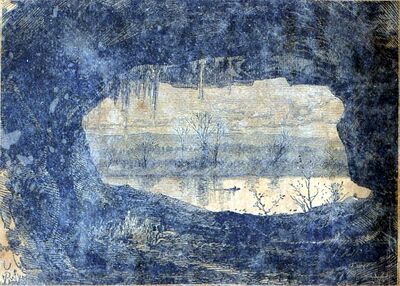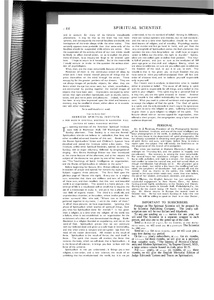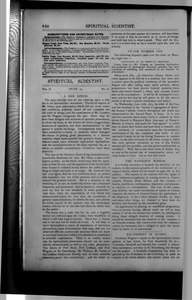< The Phenomena of Sleep and Dream (continued from page 3-225) >
and to account for many of its hitherto inexplicable phenomena. It may be that as the brain has two hemispheres, and consequently the mental faculties are double, one hemisphere of the brain sleeps while the other wakes. This certainly appears more probable than that some only of the faculties should be suspended while others are active. How the suspension of the activity of one of our two minds would be likely to affect mental action, so as to explain the phenomena of dream, is an inquiry too large to be entered upon here. I hope to return to it hereafter. But in the meanwhile I would venture to invite to this question the serious attention of psychologists.
What, then, are the most remarkable features of dream?
Foremost of them is the continuous stream of ideas, by which term I here intend mental pictures of things that impress themselves on the mind through the senses. These occupy by far the greater portions of our dreams. They are not always images of particular objects, for often they are forms which the eye has never seen, but which, nevertheless, are constructed by putting together the mental images of objects that have been seen. Impressions conveyed by other senses than sight are often reproduced, such as sounds, scents, tastes, and past nerve pains and pleasures. Indeed, whatever has been at any time impressed upon the mind and become a memory, may be recalled in dream, either alone or in association with other memories.}}
To be continued next week.
American Spiritual Institute
The opening exercises of the American Spiritual Institute were held in Rochester Hall, 730 Washington Street, Sunday afternoon. This Society is a new one formed by Spiritualists who do not believe in radicalism, free love, and other so-called advanced theories of this sect. Beside these, the Boston Spiritualists’ Union and Children’s Lyceum have dissolved and joined the Institute within a few weeks. The Institute, unlike other Spiritual Societies, opened its meeting, Sunday, with an organ voluntary, followed by congregational singing. Mrs. Emma Hardinge Britten was then introduced as the trance lecturer of the afternoon, and at her request the subject of the discourse was given by one of her hearers. It was “The Teachings of Spirit Intelligence on organization, and the Duties of Spiritualists in relation to the same.”
Before beginning her lecture, Mrs. Britten offered a fervent invocation of prayer and opened her remarks by saying: The Subject suggests three pictures. The first: look upon the glorious page of Heaven this night. Every star is a mighty sun; remember that there are millions and tens of millions of these suns, and then recollect that this vast and beautiful world is an organization. The second is a home picture; the embryo of life is a neucleated cell so small that it requires the aid of a microscope to study it, and yet it has a place in the vast field of organic matter. The third is a small, old, and unpretentious chamber, at Jerusalem, where twelve poor fishermen surround Him who said, “Where two or three are gathered together in my name, I am in the midst of them.” In all of these pictures we have organization. Ignoring that phase of Spiritualism which teaches of spiritual things, I ask you what has Spiritualism done for mortals? It has given them a religion, at a time when the religion of the world was a failure, when it was established as an organization for the enrichment of a class of men denominated the clergy. Ecclesiasticism is a religion founded on expediency, and not on the word of God. Spiritualism proves that we can commune with our beloved dead and gives us a safe hope in immortality, and that when crime is rampant and corruption ripe from the head of the nation downward. All motion is the result of force. Spiritualism is the result of force; the soul itself is force. The spirit that causes all motion; the force that restores the body, which we call dead, that is Spiritualism; it is the force of all science; it brings you face to face with the force of the universe.
Spiritualism is not yet understood; it brings you a new religion, a new order, and a new science; the result of an unfolding that has revolutionized the world, but it is not yet understood, it has no standard of belief. Among its followers, there are various opinions and theories, but no real standard; and this too at a time when Spiritualists should be the standard-bearers of religion, and of morality. Physiology teaches us that murder and lust go hand in hand, and yet from the very stronghold of Spiritualism comes the foul utterances that sanction the one—how long before we shall have an organization to follow out the other, the right to murder! Spiritualists are now called upon to define their position. The hour is full of portent, and just as sure as the revolution of 100 years ago gave us that civil and religious liberty, which we are about to celebrate, so sure are you called upon to celebrate the freedom of the soul, to put it to use, to work. The trouble is that it has given you so much freedom that you have come to think yourself emancipated from all law and order of whatever kind, and to believe yourself responsible only to yourself.
Our present want is analysis, to determine what is needed either in practice or belief. The cause of all being is spirit and the spirit is responsible for all things, and a belief in this spirit is your religion. This spirit may be a personal God or it may not; you are this spirit encased in matter. Another great trouble is that selfish individuality has been too prominent. What you need is union of sentiment and organization, to accept the religion of God the spirit. The God of spirits is a spirit, and the only obstacle in man’s way is his ignorance; you want to carry this religion to poor, suffering humanity— to give them a pure religion—a religion of the spirit. The lecturer closed with an earnest appeal for organization, then offered a short prayer; the congregation sang a hymn and the audience dispersed.
<Untitled> (The crisis was reached in Madam Blavatsky's illness)
The crisis was reached, in Madame Blavatsky’s illness, at midnight on Thursday last, and the patient is happily now convalescent. Her recovery is among the most remarkable. For several hours her attendants thought her dead, as she lay as cold, pulseless, and rigid as a corpse; her injured limb had swollen to twice the natural size, and had turned black, as though mortification had already set in. Her physician gave her up as dead; but within a few hours the swelling had' subsided, the symptoms of dissolution had passed off, and she revived. And so, thanks to the spirits, this noble life is spared to the cause which needs now, more than ever before, the aid of her wisdom, enthusiasm, devotion, and powers.
Excitement in Russia
Professor Wagner’s report on the Spiritualistic investigations of last winter, by Prof. Boutleroff, Dr. A—., Counselor Aksakoff and himself, has created a tremendous excitement, not only in St. Petersburg, but throughout the empire. A Scientific Commission has been organized by the Professors in the University, to push an inquiry in the whole subject, and neither pains nor ex-<... continues on page 3-227 >
Editor's notes
- ↑ American Spiritual Institute by Britten, Emma Hardinge, Spiritual Scientist, v. 2, No. 14, June 10, 1875, p. 166. From the Boston Globe.
- ↑ image by unknown author. ornament
- ↑ The crisis was reached in Madam Blavatsky's illness by unknown author, Spiritual Scientist, v. 2, No. 14, June 10, 1875, p. 166
- ↑ image by unknown author
- ↑ Excitement in Russia by unknown author, Spiritual Scientist, v. 2, No. 16, June 24, 1875, pp. 186-7




